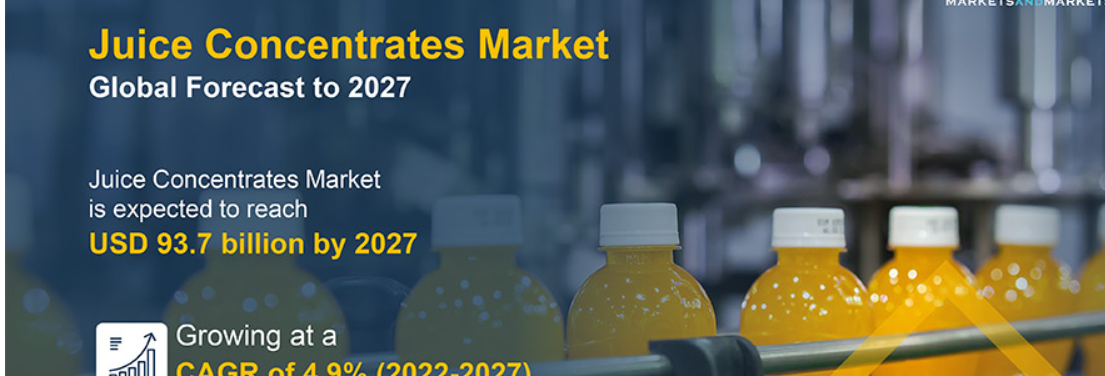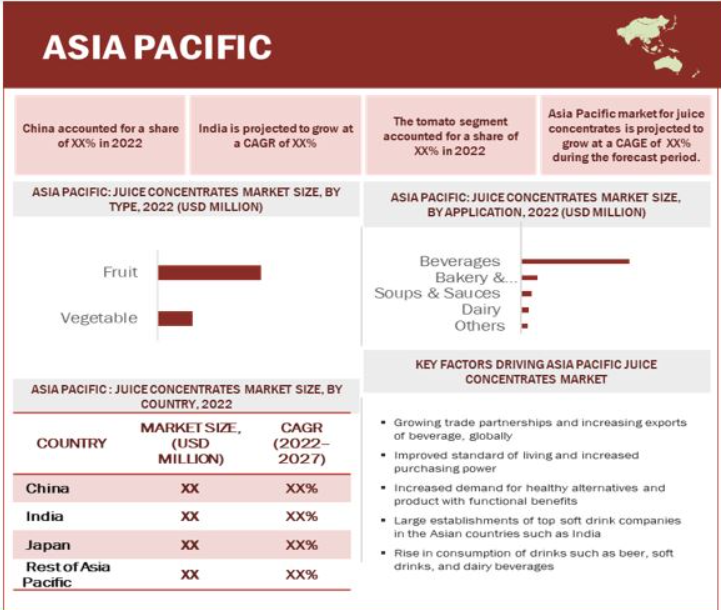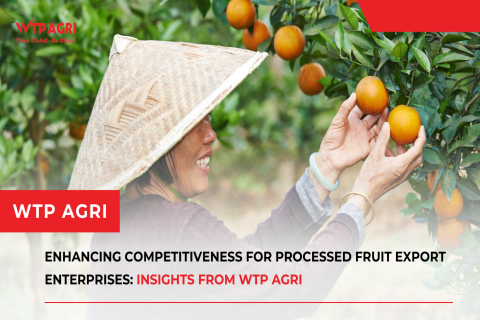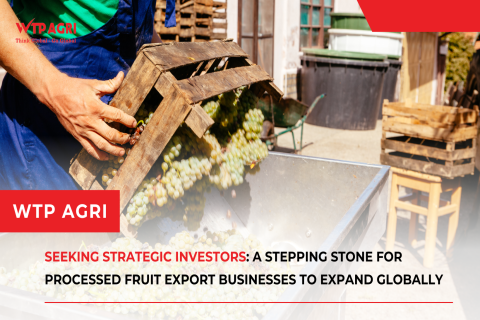Popular types of juice concentrate on the market
At a 4.9% CAGR, the global juice concentrates market is projected to grow at US$ 93.7 billion by 2027. In 2022, its valuation was US$ 73.7 billion. Juice concentrates are made by removing most of the water from the original fruit juice, leaving behind a concentrated liquid with a more intense flavor and higher sugar content than the original juice. The resulting concentrate can be stored more easily and takes up less space than the original juice, making it a popular choice for manufacturers and consumers alike.
Some of the advantages of using juice concentrates include a longer shelf life, easy transportation and storage, consistent flavor, and reduced shipping costs due to the removal of water from the product. The global market is expanding at a rapid pace, with a promising outlook that highlights the increasing demand for these versatile ingredients in a variety of food and beverage products. These highly concentrated juices are becoming increasingly popular due to their convenience, extended shelf life, and versatility in a wide range of food and beverage applications. As consumers become more health-conscious and demand easy-to-use products, juice concentrates are seen as a natural and healthy alternative to traditional juice products. This growth is being fueled by a variety of factors, including the trend towards health and wellness, the convenience and versatility of juice concentrates as an ingredient, and the increasing demand for these products in emerging economies.

As a result, the global market is set for a bright future as manufacturers continue to invest in research and development to create innovative and sustainable products that meet changing consumer demands. With their widespread use as an ingredient in soft drinks, jams, jellies, and baby foods, among other food and beverage products, the demand for juice concentrates is expected to continue its swift expansion in the coming years. This underscores the growing importance of these highly concentrated juices in the food and beverage industry, and highlights the increasing trend of consumers seeking out healthy and natural options in their diets.
Juice Concentrates Market Dynamics
Drivers: Sustainability is the key to the bolstering demand for Juice Concentrates
Global thirst for commercial beverages is rising, especially for plant-based beverages, carbon water, functional beverages as energy drinks, and ready-to-drink beverages. Beverage production necessitates safe raw material procurement and the maintenance of desired end-product characteristics through safe, cost-effective, and sustainable multi-stage processing. The industry has witnessed an increasing sustainability trend over a couple of years. Sustainable food sourcing is a prime aspect and includes shifting to use more organic and/or locally grown and raised produce in beverage plants and ties in with several goals for shrinking the environmental impact. Moreover, recently manufacturers have started to take consumer product demands seriously by working on expanding their range of products to include healthier and diet-specific items with fewer chemicals and preservatives.
Rising global food insecurity demands greater efficiency at transporting food from surplus points to famine places. Millennials and Gen Z aspire to achieve sustainability along the entire supply chain. For example, The Sustainable Trade Initiative (IDH) convenes companies, CSOs, and governments in sustainable public-private partnerships. IDH works in the processed fruit and vegetable sector to develop more sustainable production and processing practices, contribute to better environmental management, and ultimately improve workers' and farmers' livelihoods. The Sustainable Juice Covenant is a global initiative to make the sourcing, production, and trade of fruit- and vegetable-derived juices, purees, and concentrates 100% sustainable by 2030.
Restraints: Burgeoning demand for NFC juices
Not from concentrate (NFC) juices are made up of fruits that have been processed into fruit juices, and if stored in the appropriate temperature, have the advantage of lasting for up to two years. The rise in the demand for NFC juices can be attributed to the changing consumer preference from volume to nutrition. Another factor that drives the demand is the 'pureness', and 'realness' of the juice, which has positively affected consumers' buying preference. NFC juice is a more convenient product, which includes a three-step consumption process of open, pour, and consume, which proves to be a convenient product for consumers. On the other hand, NFC juices are considered to be premium juices and are priced higher when compared to regular juices; they also contain less sugar compared to other beverages and has therefore become an alternative product to carbonated beverages. The projection of NFC juices as a healthy fruit drink is causing a restraint in the growth of the juice concentrates market, since it is sold as a premium product in the market.
Challenges: Demand for clean labeled products from consumer
The Natural and organic concepts are two tools used predominantly in the food industry by marketers in order to increase the demand for natural ingredients in the market. Clean-label ingredients are essentially natural ingredients with no chemicals. With the rise in health awareness, consumers are opting for clean-label foods that use natural ingredients such as natural colors & flavors, which are safer to consume. They are ready to pay high prices for products that are minimally processed. Consumers have been observed to thoroughly check labels before buying products as they prefer clean-label ones. This challenge can be overcome through investments in natural ingredients by fruit & vegetable ingredient producers. Thus, companies are focusing on developing new products from natural sources with minimal processing, thereby making them clean-label products.
In addition to the consumers' selection of special-quality fruits & vegetables, taste and experience are also playing an increasingly important role. Consumers are willing to pay premium prices for products that have consistently good taste.
Fruit Juice Concentrates are in High Demand
Fruit juice concentrates are used in a variety of industries, such as beverage, bakery & confectionery, food, and alcohol. Fruit juice concentrates, such as apple concentrates and pear concentrates, are used as sugar substitutes in the bakery & confectionery industry, in the production of cakes, cookies, and pastries.
Fruit juice concentrates witness high demand around the world, as there is an increasing awareness regarding living a healthy life and consuming healthy products among consumers in both developed and developing countries. Fruits such as orange, apple, and pineapple have significant demand due to their health benefits. These concentrates, especially red grapes, are also used in the wine industry. Countries, such as Australia, that produce wine on a large scale have a good market opportunity for growth of the red grape concentrates market.
Beverages Segment is Gaining Traction in the Global Juice Concentrates Market
Fruits and vegetable concentrates are widely applicable in the beverage industry. Fruits concentrates are especially used in the production of both alcoholics as well as non-alcoholic beverages. Fruit and vegetable juice concentrates are used in various beverages such as energy drinks, juices, tea, and smoothies and are available in different forms such as frozen, crystallized, or liquid. Fruits such as grapes and apples are the common fruits used to produce alcoholic beverages. Moreover, exotic superfruits, such as juniper berries and passion fruits, are also utilized to make alcoholic beverages. The beverage industry, which is growing globally in all the major regions, such as North America, Europe, Asia-Pacific, and Latin America, demands fruits and vegetables to produce new and innovative beverages. The huge soft drinks market in developing nations, such as India and China, needs fruits and vegetables to concentrate on producing soft drinks based on consumer demand.
Opportunities: Value-added products are gaining momentum
Consumers have shifted preference towards food & beverages that support a healthy and sustainable lifestyle; implying, beverages should not only contain physical health benefits but beyond. While diet should provide solutions to improve digestion and boost the immune system, the products should be natural and come with a high degree of functionality. An increased level of environmental and health consciousness has got instilled amongst consumers, resulting in increasing demand for beverages with optimal nutritional and functional profiles. The Japanese beverage market witnesses demand for energy drinks, sports drinks and RTD coffee drinks. A section of beverages holding popularity is beauty drinks, beverages that support the physical appearance and skin, and is a prominent trend amongst Japanese consumers.
Implementation of state-of-the-art technologies paves way towards high-quality products from nature in various formats, be it, minimally processed full spectrum powders, which retain the entire healthy content or the raw material to high-end standardized botanical extracts with guaranteed amounts of certain naturally occurring healthy compounds, like antioxidants. Alongside plant extracts, strong infusions, distillates and essences, natural colors and flavors provide for the choice of an individual flavor and vibrant color.
Energy drinks are gaining traction owing to its innovative concepts, exciting flavors and diverse positioning options. There is a very fast-paced development in the energy drink sector, along with combining it with other categories, such as tea, coffee or juice. Natural sourcing, sugar reduction and functional added value are the attributes that are gaining significance in purchase patterns and presents a lucrative opportunity for growth. Besides, tailor-made ingredients are claiming fame in the revolutionizing juice concentrates market.

WTP Agri, boasting over 350,000 hectares of cultivation and a network of 20 processing plants nationwide, takes pride in being a premier partner in the Fruit juice concentrate industry. Our extensive scale not only allows us to grasp new flavor trends but also ensures top-tier quality. If you are seeking a reliable supplier of new flavor dried fruit in Vietnam to embark on the journey of conquering these emerging trends, WTP Agri is your most dependable choice.
Do not hesitate to reach out to us for further insight and exploration into how we may contribute to the sustainable development of your enterprise. Contact us by filling out the contact form which you can find on this page. Either get in touch with our team at agri.crm@wtp.vn or give us a call on (+84)971 279 099. And remember we can also provide tailored service if you need it.
News Related
- Dried Fruits Import: Attractive Business Opportunity for International Businesses
- 5 delicious and refreshing nata de coco drink recipes
- A step forward in bilateral cooperation between Vietnam - the United States
- Advantages of shifting the fruit juice supply chain to Vietnam
- Aloe Vera Juice – Manufacturer and Supplier

 Vietnamese
Vietnamese  Korean
Korean Japanese
Japanese Chinese
Chinese


